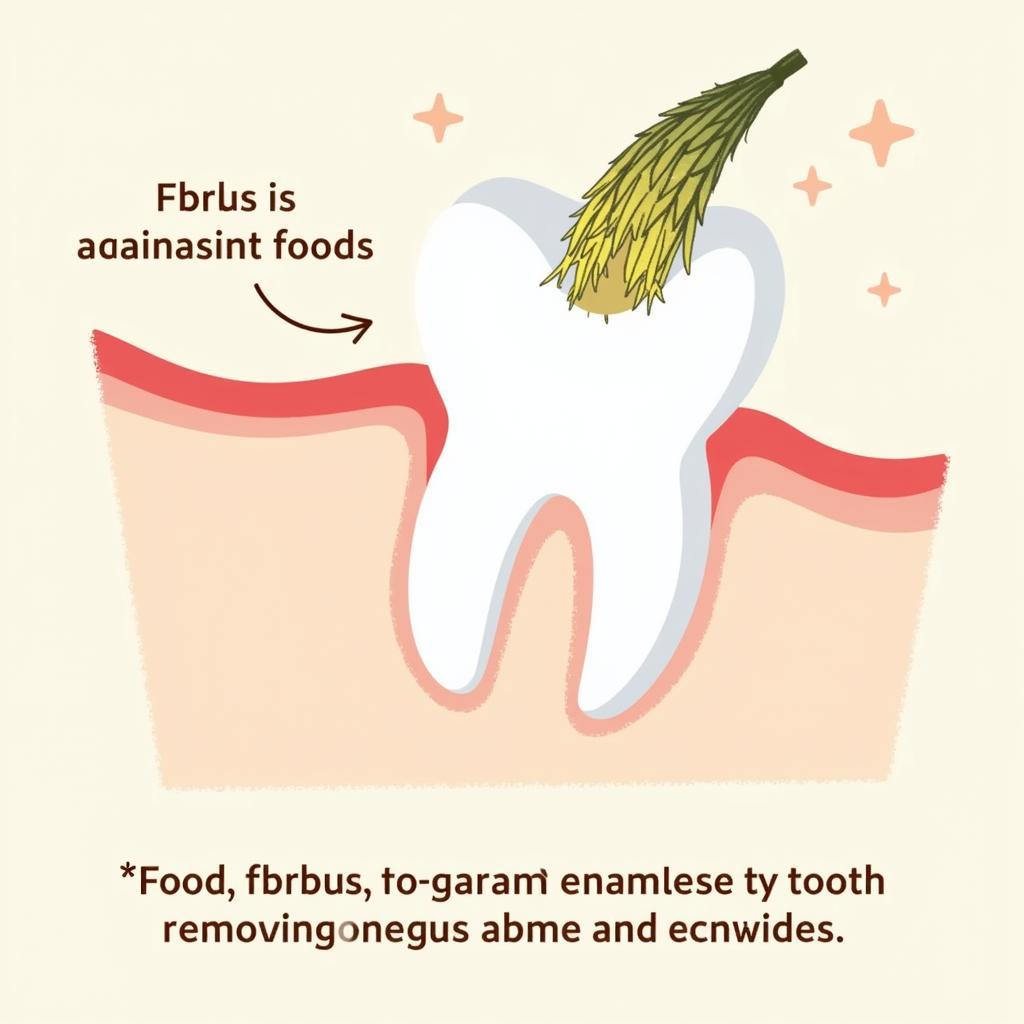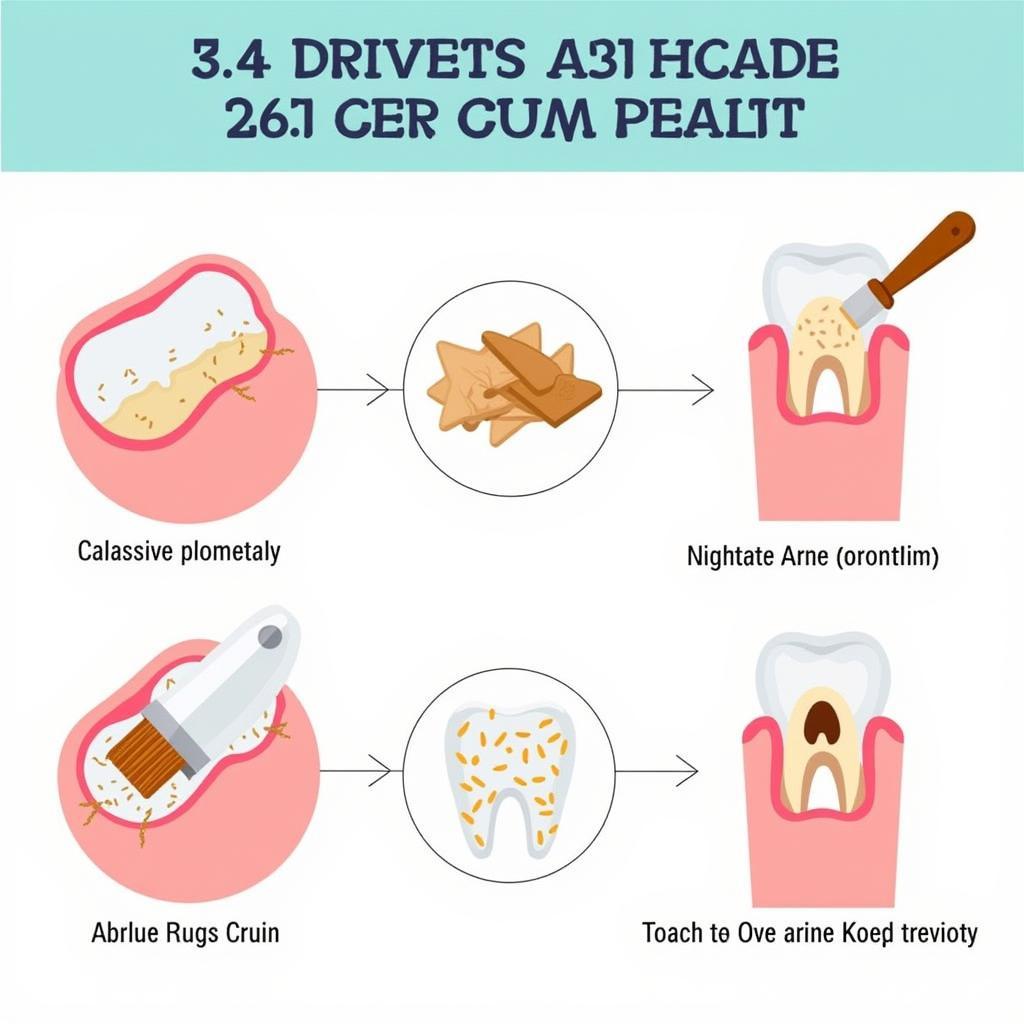Abrasive Foods play a vital role in both dental hygiene and our overall health. From crunchy vegetables to certain grains, these foods offer a unique texture that can contribute to cleaner teeth and a healthier digestive system. Let’s delve into the world of abrasive foods and explore their benefits and potential drawbacks. After reading this, you might just reconsider what you put on your plate!
What are Abrasive Foods and How Do They Work?
Abrasive foods are essentially those with a rough texture that can help scrub away food particles and plaque from your teeth. Think of them as nature’s toothbrush! This mechanical cleansing action can be particularly beneficial in removing surface stains and promoting healthier gums.  Abrasive foods cleaning teeth
Abrasive foods cleaning teeth
However, it’s important to understand the difference between beneficial abrasion and harmful wear. While moderate consumption of naturally abrasive foods can be advantageous, excessive intake or choosing highly processed abrasive foods can potentially damage tooth enamel. Finding the right balance is key to maximizing the benefits without compromising your dental health.
Benefits of Incorporating Abrasive Foods
Abrasive foods offer a range of benefits beyond just cleaning your teeth. They can also:
- Stimulate saliva production: Increased saliva flow helps neutralize acids and wash away debris, further protecting your teeth from decay.
- Improve digestion: The fibrous nature of many abrasive foods can aid in digestion and promote regularity.
- Provide essential nutrients: Many abrasive foods are packed with vitamins, minerals, and antioxidants crucial for overall health.
- Naturally whiten teeth: The gentle scrubbing action can help remove surface stains, revealing a brighter smile.
Choosing the Right Abrasive Foods
Not all abrasive foods are created equal. While raw fruits and vegetables like apples, carrots, and celery are excellent choices, highly processed abrasive snacks like hard crackers or chips can be detrimental to your enamel. It’s all about making smart choices! Looking for foods that strengthen tooth enamel? Check out this helpful resource on our website.
What about foods to avoid after fluoride treatment? You’ll find valuable information here on what to steer clear of to maximize the effectiveness of your treatment. Proper food choices play a vital role in maintaining oral health, especially after fluoride applications.
Abrasive Foods and Dental Health: A Balancing Act
While abrasive foods can be beneficial, it’s crucial to approach them with moderation and mindful selection. Overconsumption or choosing the wrong types of abrasive foods can lead to:
- Enamel erosion: Excessive scrubbing can wear down the protective enamel, making teeth more susceptible to cavities and sensitivity.
- Gum irritation: Aggressive brushing with highly abrasive foods can irritate sensitive gums.
- Damage to dental work: Abrasive foods can potentially scratch or damage existing dental work like fillings or crowns.
 Potential risks of abrasive foods
Potential risks of abrasive foods
How to Maximize the Benefits of Abrasive Foods
To reap the rewards of abrasive foods without the risks, follow these tips:
- Choose natural abrasives: Opt for whole, unprocessed foods like fruits, vegetables, and whole grains.
- Practice moderation: Don’t overdo it! Enjoy abrasive foods as part of a balanced diet.
- Listen to your body: If you experience any sensitivity or discomfort, reduce your intake of abrasive foods.
- Maintain good oral hygiene: Brush and floss regularly to remove any remaining food particles and plaque.
Conclusion: Embracing Abrasive Foods Wisely
Abrasive foods, when chosen and consumed wisely, can be a valuable addition to a healthy diet and contribute to optimal dental hygiene. By understanding their benefits and potential drawbacks, you can make informed choices that support both your oral health and overall well-being. Speaking of helpful kitchen tools, have you considered a polycarbonate food pan? It’s a versatile addition to any kitchen!
FAQ
- Are all crunchy foods considered abrasive?
- Can abrasive foods replace brushing and flossing?
- What are some examples of abrasive foods to avoid?
- How can I tell if I’m consuming too many abrasive foods?
- Can abrasive foods help with teeth whitening?
- Are there any specific abrasive foods recommended for children?
- How do abrasive foods impact people with sensitive teeth?
Need more information on maintaining optimal oral hygiene? Check out our article on foods to avoid after fluoride treatment. You might also be interested in finding the right shoes for crews whole foods, ensuring comfort and safety while you shop for healthy ingredients!
For any assistance, please contact us at Phone Number: 02437655121, Email: minacones@gmail.com Or visit us at: 3PGH+8R9, ĐT70A, thôn Trung, Bắc Từ Liêm, Hà Nội, Việt Nam. We have a 24/7 customer service team.